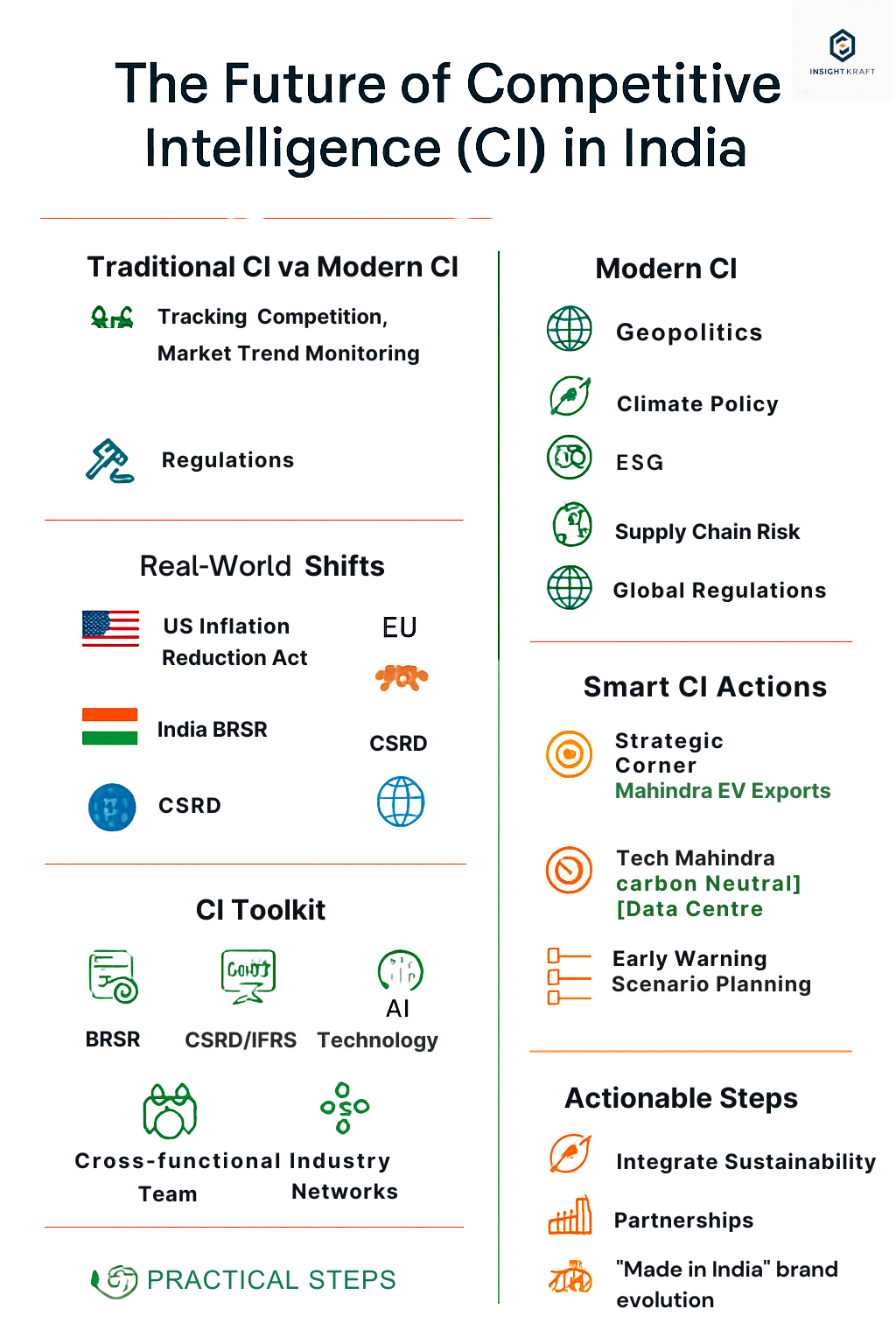The Era of Predictable Business Planning Has Ended
There was a time when business planning followed a simple formula: analyse last year’s performance, project modest growth, and execute. That linear approach doesn’t work anymore.
Today, a single policy announcement from Washington, a regulatory directive from Brussels, or a trade decision from Delhi can rewrite industry dynamics within hours. What once took months to prepare can become irrelevant overnight.
Indian corporate leaders know this all too well. Tata Steel’s leadership have had to master European carbon regulations at speed, skills they never imagined needing earlier in their careers. Reliance Industries’ pivot toward green energy shows how fast priorities can shift in response to market forces and regulatory landscapes.
In this environment, adaptation is no longer a competitive edge. It’s survival. And at the heart of survival lies a reimagined approach to competitive intelligence (CI).
The Perfect Storm That Changed Everything
The pandemic exposed how fragile our supply chains really were. Geopolitical tensions, volatile energy markets, and inflation piled on, making uncertainty the norm.
Then came the sustainability reckoning. Investors demanded accountability. Customers wanted to know how products were made and what impact they had. ESG moved from being a buzzword to a business requirement.
Now companies must achieve what seems impossible: deliver financial results while being environmentally and socially responsible. Though it sounds overwhelming, Indian firms have some unique advantages here.

Competitive Intelligence Gets a Major Upgrade
Traditional CI used to mean tracking competitors, following market trends, and keeping an eye on regulations. This process is useful but insufficient.
Modern CI is closer to air traffic control at a busy airport. Instead of just tracking a few planes, it monitors dozens of variables at once, guiding leadership through turbulence.
That means watching geopolitical shifts that could disrupt supply chains, understanding how climate policies change cost structures, following ESG investment flows, and spotting vulnerabilities before they escalate.
Take the US Inflation Reduction Act. Many see it as American domestic policy. Sharp Indian companies see it as a global clean-tech realignment with both opportunities and threats. The EU’s Carbon Border Adjustment Mechanism isn’t “just another rule”—it fundamentally alters how trade costs are calculated.
On top of this comes the regulatory maze: SEBI’s BRSR at home, Europe’s CSRD abroad, and IFRS Sustainability Standards globally. CI isn’t just about tracking them—it’s about translating them into clear business implications.
When Intelligence Drives Real Action
The best CI teams don’t just gather data. They shape decisions.
- Strategy calls: Should a company reshore manufacturing to India or expand exports? That decision rests on tariff risks, carbon costs, and competitor moves—all grounded in CI.
- Innovation and positioning: Mahindra’s EV exports are tied not only to engineering but to timing market entry with trade agreements like the UK–India FTA. Tech Mahindra’s carbon-neutral data centres win credibility with ESG-conscious clients while avoiding greenwashing risks.
- Early warning systems: Spotting a competitor’s renewable energy pivot months earlier can mean the difference between staying ahead and falling behind.
- Scenario planning: What if tariffs rise? Carbon pricing changes? Another supply chain shock? Companies with CI-driven playbooks weather these storms far better than those caught by surprise.
The Practical Toolkit
Indian companies are building creative CI systems that combine compliance with competitive edge:
- Regulatory frameworks as opportunity. SEBI’s BRSR may feel like a burden, but early adopters gain trust and credibility. Staying ahead of CSRD and IFRS standards opens international markets.
- Technology as an accelerator. AI can process policy documents, trade reports, and ESG ratings at scale. Real-time dashboards ensure leadership gets insights when they matter most.
- Cross-functional collaboration. TCS shows how legal, finance, and strategy teams can align on sustainability, turning compliance into growth.
- Industry-wide cooperation. Pharma exporters share intelligence on FDA and EU rules—collective knowledge that no single company could build alone.
India’s Unique Opportunity
India occupies a fascinating dual position: both an emerging market and a technology powerhouse, a manufacturing hub and a services leader. This allows for “dual strategies” that balance profit with purpose.
- Green hydrogen: With cost advantages and strong policy support, Indian firms can use CI to secure export markets and position themselves globally.
- EV manufacturing: Companies that read both domestic incentives and international requirements can build long-term advantages.
- Circular economy solutions: As waste management becomes critical worldwide, Indian innovators with strong CI can create products and partnerships that meet global standards.
- SME potential: Even startups can leverage CI to spot niche opportunities, comply with rules early, and scale fast.
The Road Forward
Volatility isn’t a passing phase—it’s the new baseline. For Indian strategists and CI professionals, this is both a challenge and a chance.
The winners will be those who put sustainability intelligence at the centre of strategy. That means treating environmental rules as seriously as tax laws, tracking ESG funding like traditional finance, and turning compliance into a competitive advantage.
Agility will matter more than scale. A mid-sized Indian firm with sharp CI can outmanoeuvre slower global giants. And the “Made in India” brand is shifting—from low-cost provider to resilient, innovative, responsible partner.
Why This Matters Now
The pace of change is accelerating. Indian companies must build sophisticated CI systems—or risk falling behind competitors.
India already has the ingredients: talent, innovation, and government alignment on sustainable development. The real question isn’t whether Indian companies can compete globally, but whether they’ll step up to lead.
Firms that turn regulatory complexity into advantage, sustainability into opportunity, and resilience into reputation won’t just survive uncertainty—they’ll thrive on it.
The future belongs to companies that can navigate complexity, adapt quickly, and deliver results while doing the right thing. Indian firms are uniquely positioned to show the world how it’s done.
